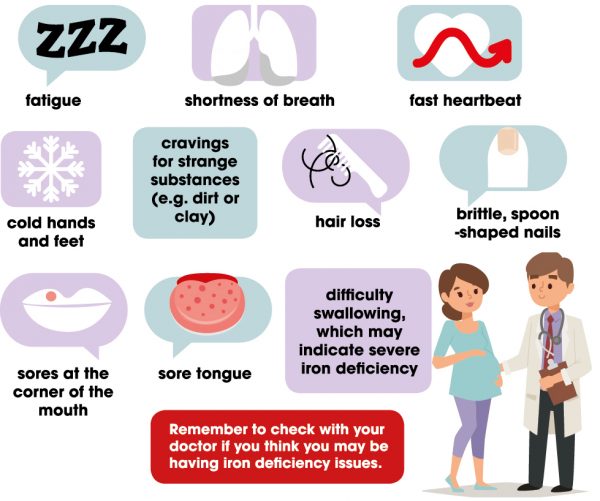Iron is an essential mineral needed for a wide variety of metabolic processes. It is also a crucial component of haemoglobin. A lack of iron can cause a condition known as iron-deficiency anaemia, which leads to insufficient oxygen supply to your body.
Both iron deficiency and anaemia among pregnant Malaysian women remains a significant and challenging health problem with a prevalence of 37%. A possible effect of severe iron deficiency in pregnant women is an increased risk of having a premature baby, or one that is smaller than normal. Iron- deficiency anaemia may be confused with thalassaemia, which is an inherited genetic blood disorder. Be sure to inform your doctor if you have a family history of thalassaemia.
How much iron does your body need?
Your body needs at least 27mg of iron every day during your pregnancy. However, the actual amount required depends on your age and overall health. It is advisable to build up your body’s store of iron (and other nutrients) before getting pregnant. You will need roughly twice the normal amount of iron during pregnancy. During your doctor’s appointment, you will probably be asked to start taking prenatal vitamins that include a low-dose iron supplement.
Do include iron-rich foods in your diet, such as meat and poultry, e.g. lean beef, chicken, egg, boiled cockles, chickpeas, bitter gourd, fried soya bean curd, and ready-to- eat-cereals fortified with iron.
Symptoms of iron deficiency
Iron deficiency is common among pregnant and lactating women. However, symptoms of iron deficiency can be vague and non-specific, such as:

Don’t make assumptions
Whether you are planning for a pregnancy or in the midst of one, make it a point to check if you are iron-deficient. The risk of anaemia increases as your pregnancy progresses and dietary iron intake alone is insufficient to fulfil your body’s iron requirement.
Your doctor can do a simple blood test to check and diagnose its severity. He can then prescribe the right amount of iron supplements you need. However, as with other medications, keep your iron supplements in a safe location, away from children.
Inform your doctor if you experience symptoms, such as nausea, vomiting, diarrhoea, dark stools, or constipation. These are symptoms of excessive iron in your body. Do not take iron supplements on your own. If your doctor determines that oral supplements do not work, injectables may be an option.
An educational collaboration with Obstetrical and Gynaecological Society of Malaysia.






Comments